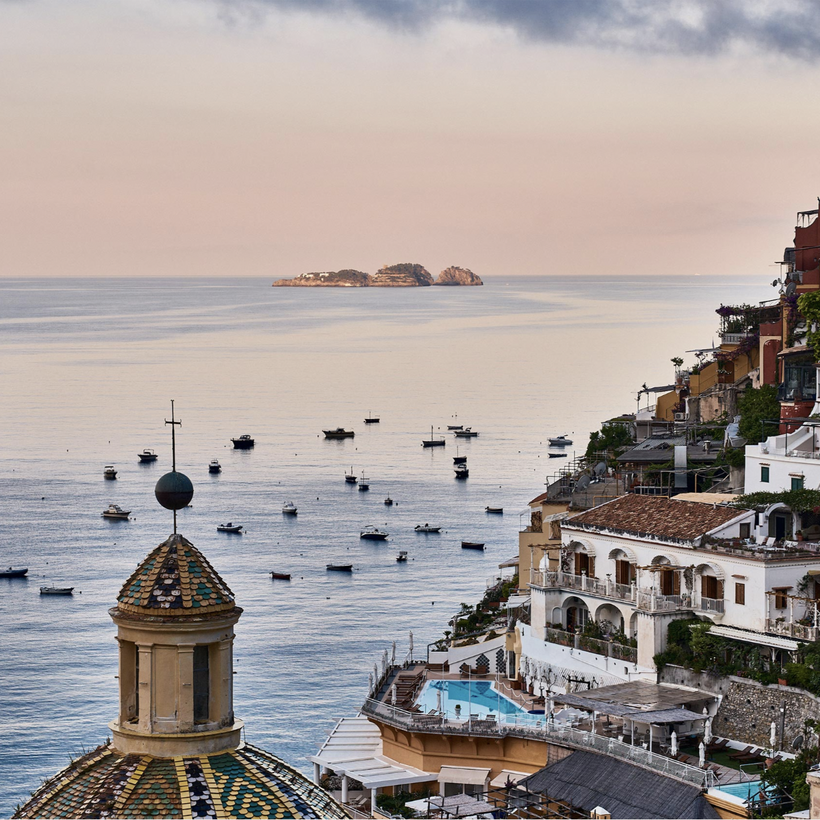In the summer of 1953, John Steinbeck, following the exhortations of his friend Alberto Moravia, hired a driver named Bassani Bassano and braved the heat (and the Italian traffic) to travel to Positano from Rome, where he was living at the time. It left an impression. “Positano bites deep,” he wrote in a column that appeared in Harper’s Bazaar later that year. “We went to the Sirenuse, an old family house converted into a first class hotel, spotless and cool, with grape arbors over its outside dining rooms.”
Exactly 70 years later, the hotel is still first-class, still spotless and cool, and still run by the same Sersale family. One has the distinct impression that not much changes at Le Sirenuse.

The prices are another matter, and have increased precipitously since Steinbeck’s visit. Today they are positively oligarchical—the high season’s nightly rate for a junior suite hover at around $5,500 a night—and all but prohibitive for most writers. Yet Le Sirenuse has managed to maintain its literary affiliations, principally through Sirenland, a tony writers’ conference that takes place every year at the hotel.
Italy, of course, is to writers what Normandy is to history buffs, who traipse its beaches in cargo shorts and tube socks in droves. The modern writers’ retreat likely evolved from that great Italian tradition of artistic patronage, from the Borgias, those underwriters of the Renaissance, to the Medicis, whose eponymous Villa Médici now confers the prestigious Prix de Rome, to Beatrice Monti della Corte’s Santa Maddalena Foundation, whose Tower in Tuscany has welcomed Edmund White, Zadie Smith, Michael Ondaatje, and Ralph Fiennes, to, perhaps, the Sersales.

The story of Sirenland begins in 2006, at (where else?) a dinner in Litchfield County, Connecticut, when then editor of Travel + Leisure magazine Nancy Novogrod introduced Antonio and Carla Sersale to the novelist Dani Shapiro and her husband, the filmmaker Michael Maren, who then reached out to fellow novelist Hannah Tinti about the idea of assembling a group of writers at the storied hotel.
Each year since, they have convened an enviable group of faculty—Susan Choi, Meg Wolitzer, Richard Russo, Tobias Wolff, Anthony Doerr, Andrew Sean Greer, Susan Orlean, Alexander Chee, André Aciman, and Elizabeth Gilbert have all participated—and 40 aspiring writers for a week of workshops, talks on the publishing industry, and the requisite literary gossip. (All this in late March, before the hordes of iPad-brandishing tourists coagulate in Positano’s tiny alleys.)
Of the lucky 40, about half are reserved for returning Sirenlanders, which contributes to the congenially clubby atmosphere. The remaining 20 spots are for promising newcomers, who offer up a section of a manuscript they hope to workshop, and a personal statement to the selection committee of Shapiro, Maren, and Tinti.

If the chance to hobnob with the literary elite wasn’t enough to fork over the admittedly steep conference fee of $5,600, then the chance to do so in such rarefied environs—at a wildly discounted room rate—seems to do the trick. Turns out, literary giants are much more willing to discuss your novel’s failure to sharply evoke believable female characters in a chaise lounge overlooking the glittering Tyrrhenian Sea than they are shivering over cold canteen coffee in the Poconos.
The days at Sirenland begin at around eight A.M., sometimes earlier, so as to best take advantage of the dreamscape daily breakfast buffet included in the conference fee. Then it’s writing workshops in small groups of eight or so, each led by a faculty member. My workshop leader was Susan Choi, whose novel Trust Exercise won her the National Book Award in 2019, and who was impossibly generous with her time and critiques. Afternoons are, for the most part, left open, encouraging guests to explore Positano, venture further afield (for lunch at Lo Scoglio, in neighboring Nerano, perhaps), or sip Negronis while trading stories of Sirenlands past.

The latter is how I learned that Andrew Sean Greer, the Pulitzer Prize–winning author of Less, was apparently prone to lounging naked on his balcony, which gave directly onto the very public pool deck. Tobias Wolff, the PEN/Faulkner winner and author of the acclaimed memoir This Boy’s Life, couldn’t have been friendlier, while another writer brought along her kid, who was, as one attendee put it, “an asshole,” and was not invited back.
The real gift of this particular writers’ conference is that, in such pristine air, the heights of literary stardom don’t seem quite as unattainable. In fact, by Friday, it’s hard not to believe that you, too, must soon be heading home to voice mails from agents wanting to discuss book-tour arrangements and acceptance speeches.

I begin to feel like Anthony Doerr, author of the best-selling All the Light We Cannot See, must have felt when his stint as a Sirenland visiting faculty member came to a close and a black Mercedes drew up to the doors of Le Sirenuse to whisk him away. I’m told that a few hours after leaving the hotel, Doerr received a phone call from his agent informing him that he’d won the Pulitzer.
Needless to say, I’m still waiting for my call.
Harrison Vail is the Communications Director for AIR MAIL


